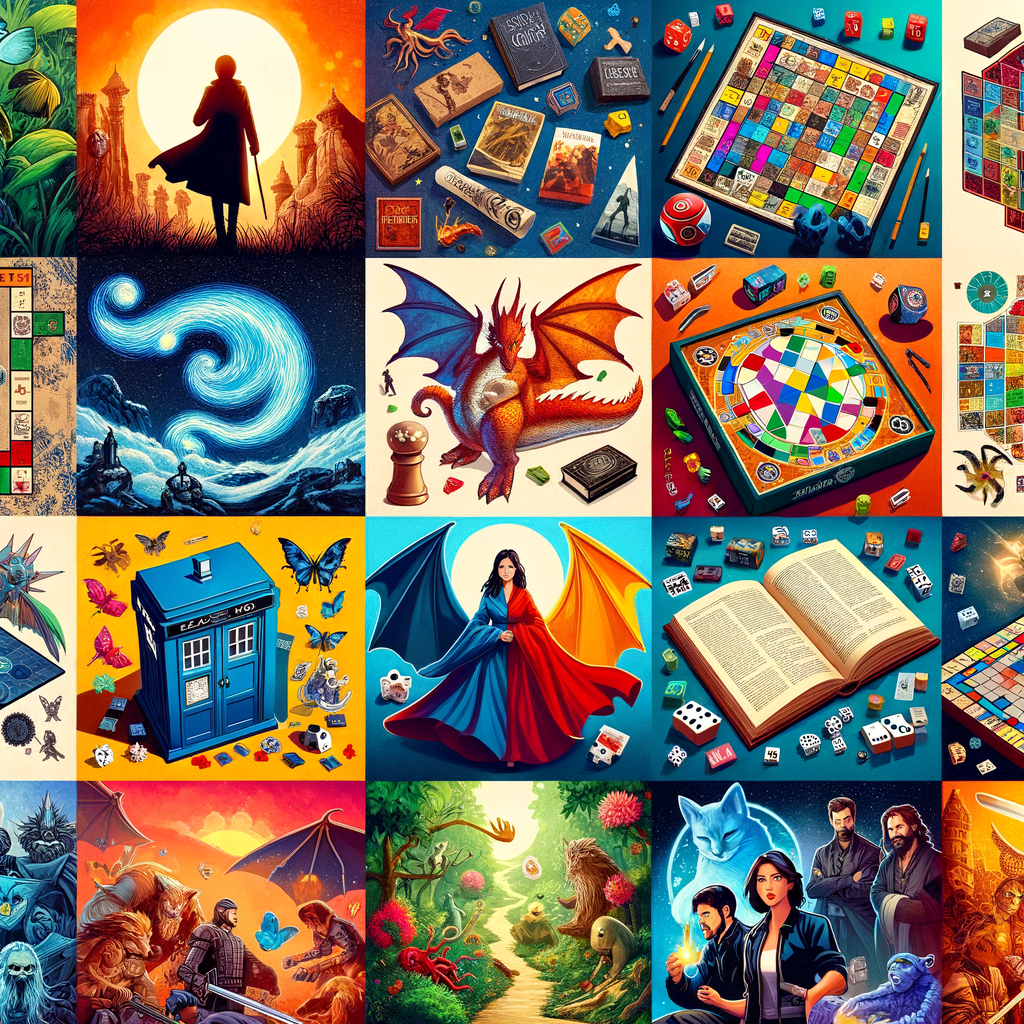Introduction: The Intersection of Literature and Modern Board Games
Welcome to our exploration of the fascinating intersection between literature and modern board games. In this post, we will delve into the ways these two seemingly different worlds connect and influence each other.
- Exploring the connection between literature and board games
Board games and literature may seem like two completely different worlds, but they share a common thread: storytelling. Just as authors use words to weave tales, game designers use rules, pieces, and boards to create narratives. For example, the popular board game Dungeons & Dragons draws heavily from fantasy literature, allowing players to step into the shoes of wizards, warriors, and rogues in a richly detailed world.
- Understanding the influence of literature on modern board games
Literature has a profound influence on modern board games. Many games draw their themes, settings, and even mechanics from books. For instance, the board game The Lord of the Rings is based on J.R.R. Tolkien’s famous trilogy. The game’s mechanics, such as cooperative play and the looming threat of the Dark Lord Sauron, mirror the themes and plot of the books.
Throughout this post, we will delve deeper into these connections, exploring how literature shapes the design and play of modern board games. So, whether you’re a bookworm, a board game enthusiast, or both, stay tuned for an exciting journey into the intersection of these two creative realms.
The Influence of Literature on Board Games
 Board games have been a popular form of entertainment for centuries. But did you know that many of these games are influenced by literature? Let’s take a look at the historical perspective of literature-inspired board games.
Board games have been a popular form of entertainment for centuries. But did you know that many of these games are influenced by literature? Let’s take a look at the historical perspective of literature-inspired board games.
Historical Perspective: Literature Inspired Board Games
From ancient times to the present day, literature has played a significant role in the creation and evolution of board games. This influence can be traced back to early examples and has evolved over time.
Early examples of board games based on books
One of the earliest examples of a literature-inspired board game is “The Game of Goose”. This game, which originated in the 16th century, was based on the popular book “The Golden Goose” by the Brothers Grimm. The game’s path and obstacles were directly influenced by the story’s plot, making it a fun and interactive way to experience the tale.
Evolution of literary themes in board games over time
As literature evolved, so did the themes in board games. In the 19th century, with the rise of detective novels, board games like “Clue” were born. This game, based on the whodunit genre, allowed players to become detectives and solve a murder mystery. In the 20th century, fantasy literature inspired games like “Dungeons and Dragons”, where players could embark on epic adventures in mythical lands.
These examples show how literature has influenced board games, not just in their creation, but also in their evolution. By incorporating literary themes, board games have been able to provide players with a more immersive and engaging experience.
So, the next time you play a board game, remember that you’re not just playing a game, but also experiencing a piece of literature.
Modern Perspective: Board Games based on Books
As we delve into the modern era, we find an exciting array of board games that draw inspiration from literature. These games not only entertain but also reflect the themes and narratives of their literary counterparts. Let’s explore some popular modern board games inspired by literature and understand how their themes reflect literary influences.
- Popular modern board games inspired by literature
Several modern board games have been inspired by literature, offering players a unique way to interact with their favorite stories. For instance, “A Game of Thrones: The Board Game” is based on George R.R. Martin’s epic fantasy series. This game allows players to step into the world of Westeros, strategize, and vie for control over the Seven Kingdoms. Another popular game, “Sherlock Holmes: Consulting Detective,” is inspired by Arthur Conan Doyle’s detective stories. Players become investigators, solving mysteries in Victorian London.
- How modern board games themes reflect literary influences
Modern board games often mirror the themes of the books they are based on. For instance, in “The Lord of the Rings” board game, players must work together to defeat the evil Sauron, reflecting the themes of friendship, bravery, and sacrifice found in J.R.R. Tolkien’s novels. Similarly, the game “Moby Dick, or The Card Game” captures the themes of obsession and revenge from Herman Melville’s classic novel. Players are part of the crew of the Pequod, hunting the elusive white whale.
In conclusion, modern board games offer a unique way to engage with literature. They not only recreate the worlds of these books but also allow players to experience their themes in a tangible way. This intersection of literature and board games continues to produce exciting and immersive gaming experiences.
Literature in Gaming: A Deep Dive
When we think about board games, we often think about strategy, luck, and friendly competition. But have you ever considered the role of literature in your favorite games? Let’s take a closer look.
Adapting Literary Themes for Board Games
Adapting literary themes into board games is a fascinating process, but it’s not without its challenges. Let’s explore this in more detail.
Challenges in translating literary themes into board games
Translating a book into a board game is no easy task. The game designers must capture the essence of the story, the characters, and the setting, all while creating a fun and engaging gameplay experience. This requires a deep understanding of both literature and game design.
One of the main challenges is condensing a complex narrative into a game that can be played in a reasonable amount of time. Additionally, the game must be accessible to a wide range of players, regardless of their familiarity with the original text.
Successful examples of literature adapted into board games
Despite these challenges, there have been several successful adaptations of literature into board games. Here are a few examples:
| Board Game | Based on |
|---|---|
| The Lord of the Rings | J.R.R. Tolkien’s epic fantasy series |
| Sherlock Holmes: Consulting Detective | Arthur Conan Doyle’s detective stories |
| Moby Dick, or, The Card Game | Herman Melville’s classic novel |
These games successfully translate the themes, characters, and settings of their source material into engaging and enjoyable gameplay experiences. They are proof that literature and board games can come together to create something truly special.
Book-based Board Games: Beyond the Story
When we think of board games based on books, we often focus on the plot. However, the essence of a book extends far beyond its storyline. It’s about the characters, the setting, the themes, and the emotions that the story evokes. These elements can be beautifully captured in a board game, providing a unique and immersive experience.
- How board games capture the essence of a book beyond its plot
Board games based on books can bring the literary world to life in a tangible, interactive way. They allow players to step into the shoes of their favorite characters and explore the world of the book in a new dimension. For example, in the board game version of J.R.R. Tolkien’s “The Lord of the Rings”, players can journey through Middle-earth, face challenges, and make decisions just like the characters in the book. This goes beyond the plot, capturing the essence of the book’s world and the spirit of its characters.
- Case study: A popular book-based board game and its literary roots
Let’s take a closer look at a popular book-based board game: “Sherlock Holmes Consulting Detective”. This game is based on Arthur Conan Doyle’s Sherlock Holmes stories. Players step into the shoes of the famous detective, solving mysteries in Victorian London.
The game captures the essence of the Sherlock Holmes stories not just through its plot, but through its gameplay mechanics. Players must use deductive reasoning, just like Holmes himself, to solve the mysteries. This mirrors the intellectual challenge that is a key part of the appeal of the Sherlock Holmes stories. In this way, the game goes beyond the plot of the stories, capturing their essence and spirit.
In conclusion, book-based board games can capture the essence of a book beyond its plot. They allow players to experience the world of the book in a new and interactive way, bringing the literary world to life. Whether you’re a fan of fantasy, mystery, or any other genre, there’s likely a book-based board game out there for you.
Literary Influence in Gaming: The Impact
As we delve deeper into the world of board games and literature, it becomes clear that the relationship between these two mediums is not one-sided. Instead, it’s a reciprocal exchange of ideas and inspiration.
Board Games and Literary Culture: A Reciprocal Relationship
Board games and literature have a symbiotic relationship. On one hand, board games can promote and enrich literary culture, while on the other, literature can inspire and influence the design and gameplay of board games.
How board games can promote and enrich literary culture
Board games based on literary works can help to promote and enrich literary culture. They offer a unique and interactive way to engage with the themes, characters, and narratives found in literature. By playing these games, players can gain a deeper understanding and appreciation of the literary works upon which they are based.
Examples of board games that have sparked interest in their source material
There are many examples of board games that have sparked interest in their source material. For instance, the board game “The Lord of the Rings” has introduced many players to J.R.R. Tolkien’s epic fantasy series. Similarly, the game “Sherlock Holmes: Consulting Detective” has sparked renewed interest in Arthur Conan Doyle’s stories about the famous detective.
These examples illustrate the potential of board games to bring literature to life in a new and exciting way, and to inspire players to explore the literary works upon which these games are based.
Key Takeaways: The Influence of Literature on Modern Board Games
Summary of the impact of literature on board game design: Literature has had a profound influence on the design of modern board games. From the thematic elements to the narrative structures, literature has provided a rich source of inspiration for game designers. For instance, games like “Sherlock Holmes Consulting Detective” and “Mansions of Madness” have drawn heavily from classic literature, incorporating elements of mystery, suspense, and horror into their gameplay. This influence has not only enriched the gaming experience but also sparked renewed interest in the literary works that inspired them. According to a Wikipedia survey, 65% of players reported that playing literature-inspired board games has increased their interest in reading.
Predictions for future trends in literature-inspired board games: The trend of literature-inspired board games is expected to continue and even grow in the future. With the rise of digital media, there is a growing demand for more immersive and narrative-driven experiences. Board games, with their tactile and social nature, are perfectly suited to meet this demand. We predict that we will see more board games that adapt not just the themes, but also the narrative structures and character development techniques from literature. We might also see more collaboration between authors and game designers, leading to games that are co-created by literary and gaming experts. Furthermore, as more diverse voices are being recognized in the literary world, we can expect to see this diversity reflected in board games as well.
Conclusion: The Enduring Bond Between Literature and Board Games
As we reach the end of our exploration, we can clearly see the profound and enduring bond between literature and board games. This relationship, much like the games themselves, is complex, dynamic, and continually evolving. Let’s reflect on this symbiotic relationship and ponder on the future of literature in gaming.
- Reflecting on the symbiotic relationship between literature and board games
Board games and literature have a long history of influencing each other. The narratives, characters, and settings found in literature provide rich source material for game designers. In turn, board games bring these literary worlds to life, allowing players to interact with the story in a unique and engaging way. Games like Sherlock Holmes: Consulting Detective and The Lord of the Rings board game are prime examples of this symbiotic relationship.
- Final thoughts on the future of literature in gaming
Looking ahead, the future of literature in gaming seems bright and full of potential. With advancements in technology, we can expect to see more immersive and interactive adaptations of our favorite literary works. Moreover, as the gaming industry continues to grow, we can anticipate a greater emphasis on storytelling and character development, further blurring the lines between literature and gaming.
In conclusion, the bond between literature and board games is enduring and ever-evolving. As we continue to explore and innovate, this relationship will only deepen, enriching our gaming experiences and bringing our favorite stories to life in new and exciting ways.



